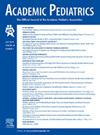Prioritizing Health Literacy Educational Objectives for Pediatric Residents – A Delphi Study
IF 3
3区 医学
Q1 PEDIATRICS
引用次数: 0
Abstract
Objective
Children of caregivers with limited health literacy are at risk of poorer health outcomes. Thus, health literacy-informed communication tools are critical to achieving a more equitable health system. However, there is no agreement on the health literacy skills pediatric residents should attain. We used Delphi methodology to establish consensus on health literacy objectives to inform development of a pediatric resident curriculum.
Methods
Our Delphi panel participated in three rounds of anonymous surveys to rank the importance of health literacy objectives in pediatric resident education. Consensus was defined as ≥70% of panelists identifying an objective as essential or 100% agreeing an objective was recommended or essential.
Results
Thirteen pediatric health literacy experts comprised a racially, geographically, and professionally-diverse panel. After three survey rounds, 27 of the initial 65 objectives met consensus. All final objectives aligned with Accreditation Council for Graduate Medical Education (ACGME) core competencies.
Conclusions
A panel of pediatric health literacy experts established consensus on health literacy objectives specific to pediatric resident training. These prioritized objectives align with ACGME core competencies, as well as evidence-based strategies like teach-back, and newer considerations like addressing organizational health literacy. They should inform future health literacy curricula and assessment within pediatric residency programs.
儿科住院医师健康素养教育目标的优先排序--德尔菲研究。
目的健康素养有限的照顾者的子女面临着健康状况较差的风险。因此,以健康素养为基础的沟通工具对于建立一个更加公平的医疗体系至关重要。然而,关于儿科住院医师应具备的健康素养技能,目前还没有达成一致意见。我们采用德尔菲法就健康素养目标达成共识,为儿科住院医师课程的开发提供参考:我们的德尔菲小组参与了三轮匿名调查,对儿科住院医师教育中健康素养目标的重要性进行排序。达成共识的定义是:≥70%的小组成员认为某项目标是必要的,或100%的小组成员同意某项目标是推荐的或必要的:13 位儿科健康素养专家组成了一个种族、地域和专业多元化的小组。经过三轮调查,最初的 65 项目标中有 27 项达成了共识。所有最终目标均符合美国毕业医学教育认证委员会(ACGME)的核心能力要求:儿科健康素养专家小组就儿科住院医师培训的健康素养目标达成了共识。这些优先目标符合 ACGME 的核心能力,也符合循证策略(如回教)和新的考虑因素(如解决组织健康素养问题)。它们将为未来儿科住院医师培训项目中的健康素养课程和评估提供参考。
本文章由计算机程序翻译,如有差异,请以英文原文为准。
求助全文
约1分钟内获得全文
求助全文
来源期刊

Academic Pediatrics
PEDIATRICS-
CiteScore
4.60
自引率
12.90%
发文量
300
审稿时长
60 days
期刊介绍:
Academic Pediatrics, the official journal of the Academic Pediatric Association, is a peer-reviewed publication whose purpose is to strengthen the research and educational base of academic general pediatrics. The journal provides leadership in pediatric education, research, patient care and advocacy. Content areas include pediatric education, emergency medicine, injury, abuse, behavioral pediatrics, holistic medicine, child health services and health policy,and the environment. The journal provides an active forum for the presentation of pediatric educational research in diverse settings, involving medical students, residents, fellows, and practicing professionals. The journal also emphasizes important research relating to the quality of child health care, health care policy, and the organization of child health services. It also includes systematic reviews of primary care interventions and important methodologic papers to aid research in child health and education.
 求助内容:
求助内容: 应助结果提醒方式:
应助结果提醒方式:


